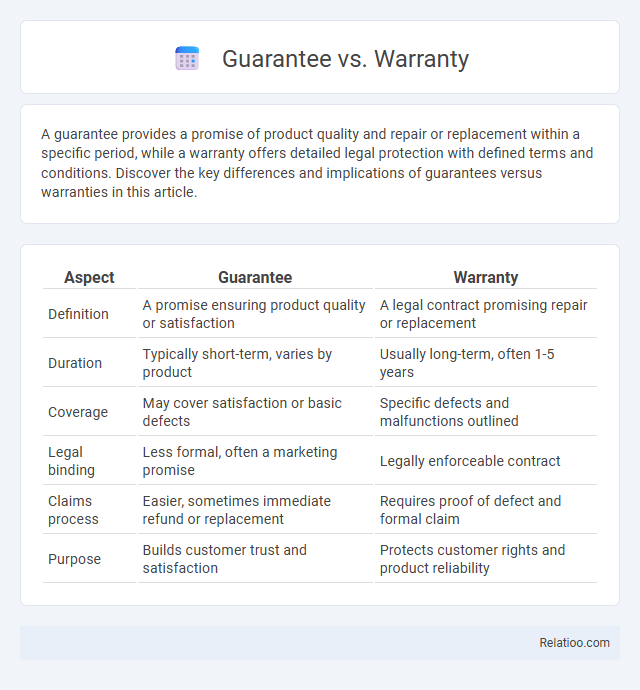A guarantee provides a promise of product quality and repair or replacement within a specific period, while a warranty offers detailed legal protection with defined terms and conditions. Discover the key differences and implications of guarantees versus warranties in this article.
Table of Comparison
| Aspect | Guarantee | Warranty |
|---|---|---|
| Definition | A promise ensuring product quality or satisfaction | A legal contract promising repair or replacement |
| Duration | Typically short-term, varies by product | Usually long-term, often 1-5 years |
| Coverage | May cover satisfaction or basic defects | Specific defects and malfunctions outlined |
| Legal binding | Less formal, often a marketing promise | Legally enforceable contract |
| Claims process | Easier, sometimes immediate refund or replacement | Requires proof of defect and formal claim |
| Purpose | Builds customer trust and satisfaction | Protects customer rights and product reliability |
Definition of Guarantee
A guarantee is a formal promise assuring the quality, performance, or durability of a product, often legally binding and offering repair, replacement, or refund if terms are unmet. Unlike a warranty, which typically details specific conditions and coverage periods, a guarantee tends to be broader and may not always be in writing. Your understanding of the guarantee helps ensure you know your rights and remedies when a product fails to meet promised standards.
Definition of Warranty
A warranty is a formal assurance provided by a manufacturer or seller that a product will perform as specified and is free from defects for a certain period. It legally binds the provider to repair, replace, or refund the product if it fails to meet the promised quality or functionality. Warranties differ from guarantees, which are broader, less formal promises of satisfaction or performance, and are distinct from guarantees that can refer to personal or third-party commitments beyond product quality.
Key Differences Between Guarantee and Warranty
Guarantee and warranty both protect your purchase but differ in scope and enforcement. A guarantee is a promise of product quality and satisfaction, often covering repairs or replacements without strict legal obligations, while a warranty is a formal, legally binding agreement detailing specific repair or replacement terms within a set period. Understanding these key differences helps you make informed decisions about product protection and your rights as a consumer.
Legal Implications of Guarantees vs Warranties
Guarantees legally bind the seller to ensure product quality or performance, often providing a full refund or replacement if the product fails within a specified period. Warranties, typically longer-term and detailed, outline specific conditions for repair or replacement but may limit liability through terms and exclusions. Understanding the legal implications of your guarantee versus warranty helps protect your consumer rights and clarifies the scope of the seller's obligations.
Types of Guarantees
Guarantees include various types such as money-back guarantees, lifetime guarantees, and performance guarantees, each ensuring specific customer protections and satisfaction levels. Money-back guarantees allow refunds within a set period, while lifetime guarantees cover product defects for the item's entire lifespan, and performance guarantees ensure the product meets specified standards. Understanding these distinct guarantee types helps consumers make informed purchasing decisions and enhances trust in product reliability.
Types of Warranties
Warranties come in various types, including express warranties explicitly stated by the seller, implied warranties that legally assure a product's basic functionality, and extended warranties offering additional coverage beyond the standard period. You should understand that express warranties cover specific product features, while implied warranties ensure the item is fit for its intended use. Choosing the right type of warranty protects your investment by addressing potential defects or malfunctions within a defined timeframe.
Consumer Rights: Guarantees vs Warranties
Guarantees and warranties both provide consumer protection by assuring product quality and reliability, but guarantees often represent a promise of repair or replacement without cost within a specified time, while warranties are legally binding contracts that outline specific coverage terms. Consumer rights under guarantees typically include free repairs or replacements if products fail to meet promised standards, whereas warranties may limit coverage to certain parts or defects and require proof of purchase. Knowing your rights under each ensures that you can confidently seek remedies when products do not perform as expected.
Duration and Coverage: Guarantee vs Warranty
A guarantee typically offers broad protection for a specified period, ensuring your product meets certain quality standards, while a warranty provides detailed coverage for specific repairs or replacements within a set timeframe. The duration of a guarantee is often shorter but more comprehensive, whereas warranties can last longer and focus on particular components or defects. Understanding the difference helps you maximize your benefits and know exactly what protections apply over time.
Claim Process Explained
A warranty outlines specific coverage details and timeframes for repairs or replacements, while a guarantee often provides a broader promise of product satisfaction or performance, sometimes without strict conditions. Claims under warranties typically require proof of purchase, defect verification, and following manufacturer instructions, whereas guarantee claims may involve returning the product or refund requests with fewer procedural steps. Understanding the distinctions helps consumers navigate claim processes efficiently, ensuring proper documentation and adherence to terms for successful resolution.
Choosing Between Guarantee and Warranty
Choosing between a guarantee and a warranty depends on the level of coverage and legal obligations you need for your purchase. A guarantee is a promise ensuring product satisfaction or performance, often offering a refund or replacement without strict legal terms, while a warranty provides detailed protection against specific defects with defined repair, replacement, or refund terms. Understanding your rights under each option helps you make an informed decision about protecting your investment effectively.

Infographic: Guarantee vs Warranty
 relatioo.com
relatioo.com